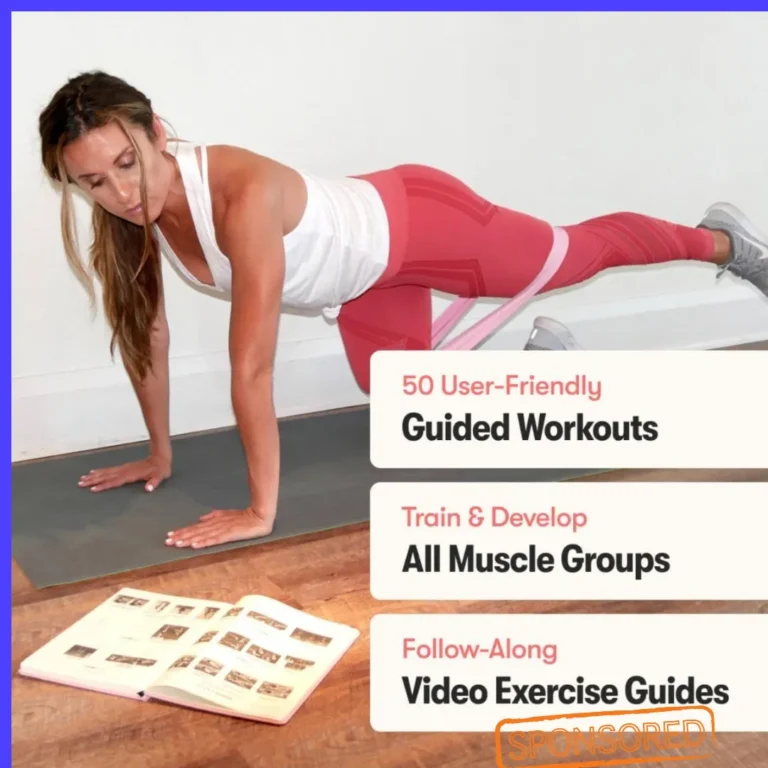Tips To Help You Get And Stay Fit
Getting fit and staying that way can feel like an uphill battle, but it doesn’t have to be.
In today’s fast-paced world, maintaining a healthy lifestyle often takes a backseat, yet incorporating small, effective changes can make a substantial impact.
This article offers a comprehensive guide filled with practical tips to help you not only achieve your fitness goals but also sustain them for the long haul.
Making fitness a lifestyle change helps you avoid slipping into old habits.
Keep a fit journal to track workouts and dietary habits.
This can boost motivation and monitor progress.
Aim for over 150 minutes of physical activity each week.
Break this into smaller sessions to fit into your daily routine.
Simple tasks like walking your dog or going for walks with family members can help increase daily activity levels.
Table of Contents Tips To Help You Get And Stay Fit
Tips
- Set exercise goals that are realistic and achievable.
- Engage a friend to join fitness activities.
- This creates accountability and adds fun.
- Choose moderate activities you enjoy, like brisk walking or using a stationary bike.
- Fit exercise into your lunch break for convenience.
Suggested Activities (Weekly Minutes)
| Activity | Minutes per Week |
| Brisk Walking | 90 |
| Arm Exercises | 30 |
| Stationary Bike | 90 |
| Light Stretching | 40 |
Regular exercise supports heart health, reduces the risk of heart disease, and improves mental health.
Consult a health care professional before starting any new exercise regimen for personalized advice.
Remember, every small step counts towards a healthy lifestyle.
Here’s the real deal!
Staying fit is crucial for both your physical and mental health.
A well-rounded exercise routine can improve heart health, lower blood pressure, and help maintain a healthy weight.
According to Laila Ajani, founder of Push Personal Fitness, incorporating a mix of exercises is key to achieving balance.
A good exercise regimen might include pushing and pulling exercises, core workouts, and using dumbbells for strength enhancement.
Always consult a health care professional before starting new activities, especially if you’re over 60 or have health conditions such as heart disease.
Regular exercise benefits all aspects of life but make sure to switch up activities to avoid fitness plateaus.
Mixing various workouts not only boosts physical health; it also benefits your mental health by keeping you engaged.
Try integrating different forms of physical activity, like brisk walking during your lunch break or using a stationary bike.
These healthy choices can become a part of your daily routine.
Staying fit is about making exercise a natural part of everyday life, ensuring long-term health benefits and reducing the risk of heart disease and other health issues.
Discover Activities You Love
Discovering activities you love is key to staying fit and making exercise a regular part of your life.
When you choose physical activities that you enjoy, it no longer feels like a chore.
Instead, it’s an experience you look forward to.
Experiment with different activities to find what truly makes you happy and keeps you motivated.
Dancing, swimming, cycling, and playing sports are just a few options that can become enjoyable parts of your routine.
Here’s a simple list to help you get started:
- Try Out New Activities: Keep exploring until you find what excites you.
- Mix It Up: A mix of activities can keep things interesting and fun.
- Listen to Your Body: Choose activities that feel good and suit your physical health.
By incorporating activities you enjoy, exercise becomes a sustainable and rewarding part of everyday life.
This approach not only helps maintain a healthy weight and improve physical health but also supports mental health.
Enjoyment in your exercise routine makes it more likely you’ll keep it up, leading to lasting health benefits.
Incorporate Aerobic Exercise: Moderate and Vigorous Intensity
Incorporate aerobic exercise into your routine to boost your physical health.
Aim for at least 150 minutes of moderate-intensity activities such as brisk walking or water aerobics each week.
Add options like running or swimming laps for 75 minutes if you prefer vigorous-intensity exercise.
These activities enhance heart health and help prevent heart disease.
Use the talk test to gauge intensity: if you can talk but not sing, it’s moderate.
Vigorous activities, however, will leave you too breathless to speak in full sentences.
Knowing your target heart rate can also help track your exercise intensity.
Here’s a quick guide:
| Intensity Level | Description | Examples |
| Moderate | Can talk, but can’t sing | Brisk walking, water aerobics |
| Vigorous | Too breathless to talk in full sentences | Running, swimming laps |
Regular exercise offers numerous health benefits, such as managing blood pressure and reducing the risk of heart disease.
Make aerobic activities a part of your everyday life to maintain a healthy weight and enhance both physical and mental health.
Consult a health professional for personalized recommendations to meet your exercise goals.
Mix Up Your Exercise Routine for Balance and Engagement
Mixing up your exercise routine is crucial for maintaining balance and engagement.
Engaging in diverse physical activities targets various muscle groups, preventing boredom and plateaus in progress.
Try combining cardio, strength training, flexibility exercises, and balance workouts.
Here’s a simple plan to keep your routine interesting:
| Day | Activity |
| Monday | Brisk walking |
| Tuesday | Yoga |
| Wednesday | Weightlifting |
| Thursday | Running |
| Friday | Arm exercises |
| Saturday | Gardening |
| Sunday | Rest or Stretch |
This schedule keeps every day unique, enhancing enjoyment while building a sustainable routine.
Mixing activities like running, yoga, and weightlifting maximizes the benefits of your regimen.
Even non-traditional exercises, such as gardening or dog walking, offer valuable diversity and contribute to physical health.
Remember, variety not only boosts physical health but also supports mental health by reducing stress.
A diverse exercise routine supports heart health and reduces the risk of heart disease.
Consistent, moderate-intensity exercise helps maintain a healthy weight and improves overall fitness.
Consult a health care professional for personalized advice suited to your health needs.
Establish a Sustainable Routine with Rest Days
Creating a sustainable fitness routine involves planning and flexibility.
Here are some tips to help you:
- Schedule Rest Days: Include rest days in your weekly plan to prevent over-training.
- Use these days for gentle strolls, stretching, or mobility work, which aid in recovery.
- Consistency: Try to exercise at the same time each day.
- This makes it a natural part of your daily routine.
- Variety: Mix different activities like cardio, strength, and flexibility exercises.
- This keeps your routine interesting and engages various muscle groups to avoid a fitness plateau.
- Movement Snacking: If you’re busy, short bursts of activity, such as star jumps or stair climbing, can help maintain your activity levels throughout the day.
Here is a sample routine:
| Day | Activity |
| Monday | Brisk walking (cardio) |
| Tuesday | Arm exercises (strength) |
| Wednesday | Rest (stretching/mobility) |
| Thursday | Stationary bike (cardio) |
| Friday | Balance exercises |
Incorporating these tips into your daily life can help you reach your exercise goals, manage health conditions, and improve your mental and physical health.
Prioritize Whole Foods Over Processed Ones
Choosing whole foods over processed ones can make a big difference in your health.
Whole foods are rich in vitamins, minerals, and nutrients.
This helps boost energy and reduce the risk of health issues.
Examples of whole foods include fresh fruits, vegetables, nuts, and lean meats.
Processed foods often contain added sugars, salt, and trans fats.
These can contribute to weight gain and health problems.
Frequent consumption of processed foods may also lead to nutrient deficiencies and impact overall well-being.
Here’s a quick comparison:
| Whole Foods | Processed Foods |
| Fresh fruits/veggies | Packaged snacks |
| Lean meats | Fast food |
| Nuts and seeds | Sugary cereals |
To make healthier choices:
- Opt for fresh produce.
- Choose whole grains.
- Limit sugary snacks and drinks.
By including whole foods in your daily routine, you support your physical health and enhance heart health.
Talk with a health care professional for personalized advice.
Stay Hydrated for Optimal Performance
Staying hydrated is key to keeping your body and brain in top shape.
Drinking 1.5 to 2 liters of water a day helps regulate your body temperature and aids digestion.
It can also make you feel fuller, which helps curb unnecessary calorie intake.
Proper hydration has a huge impact on mental health too.
It boosts concentration and reduces fatigue and headaches.
To make sure you stay hydrated, consider carrying a reusable water bottle with you.
This simple habit ensures you meet your daily water needs.
Here’s a quick table with tips for staying hydrated:
| Tip | Benefit |
| Drink 1. 5-2 liters daily | Reduces calorie intake |
| Use a reusable bottle | Easy access to water |
| Increase intake when exercising | Replenishes lost fluids |
| Hydrate in hot climates | Maintains body functions |
| Consume more during illness | Fights dehydration effects |
Remember, you need more water during physical activity, hot weather, or when dealing with flu symptoms.
So, keep a mental note, grab that bottle, and sip water throughout the day for better performance in everyday life.
Practice Responsible Alcohol Consumption
Drinking too much alcohol can harm your liver, brain, and heart.
It also raises the risk of certain cancers like breast, colorectal, and liver cancer.
Over consumption can negatively affect your mental health too.
Therefore, it’s important to drink responsibly.
The U.S. Department of Health and Human Services defines moderate drinking as:
| Gender | Standard Drinks per Day |
| Women | Up to 1 drink |
| Men | Up to 2 drinks |
Effects of Excessive Drinking:
- Liver damage
- Brain impairment
- Increased heart disease risk
- Higher cancer risk
An occasional drink is unlikely to affect your health significantly.
However, regular excessive drinking can lead to severe health issues.
If you’re unsure about how alcohol affects your health, consult a health care professional.
Tips for Responsible Drinking:
- Stick to the recommended limits.
- Balance alcohol with water.
- Avoid drinking on an empty stomach.
By practicing moderation, you can enjoy the benefits of social drinking while protecting your health.
Responsible consumption is key to ensuring alcohol does not take a heavy toll on your organs.
Manage Stress Through Healthy Outlets
Managing stress is vital for your physical and mental health.
Regular exercise is a great way to handle stress.
It relaxes you and improves how you cope with stress.
Brisk walking, using a stationary bike, or light arm exercises are effective.
Healthy eating habits, like choosing fruits over ice cream, support overall well-being and stress management.
Adequate sleep also plays a key role.
Aim for eight hours each night to manage stress better.
Breathing exercises can help too.
Try diaphragmatic breathing to lower stress hormones and calm your body.
Engage with family, friends, or faith communities for emotional support.
Here’s a quick list to help you:
- Exercise Routine: Incorporate physical activity into your daily routine.
- Healthy Choices: Opt for nutrient-rich foods.
- Sleep Schedule: Aim for consistent, quality sleep.
- Breathing Techniques: Practice deep breathing exercises.
- Social Support: Connect with supportive people.
These tips not only reduce stress but also benefit overall health.
Consult a health professional for personalized advice.
Ensure Adequate Sleep for Recovery
Getting enough sleep is a key part of staying healthy and fit.
It helps repair cells and restore energy.
A regular sleep schedule can boost both physical and mental health.
This is because it helps you fall asleep faster and enhances sleep quality.
Poor sleep can have negative effects.
It increases stress, weakens your commitment to exercise, and may lead to eating more high-calorie foods.
Adults need about seven or more hours of sleep each night.
The exact amount can vary with age, but getting enough sleep is crucial for proper body function.
Insufficient sleep can weaken your immune system.
This makes you more likely to get sick and slows recovery from illness.
Here are some tips for better sleep:
- Set a consistent sleep schedule.
- Avoid screens before bed.
- Keep your bedroom cool and dark.
- Avoid high-calorie foods like ice cream before bed to improve sleep quality.
A good night’s sleep supports your everyday life and overall health.
It’s as important as regular exercise and healthy choices.
If you have trouble sleeping, consider talking to a health care professional.
Proper sleep can help you reach your fitness goals and improve your physical health.
Stay Socially Connected for Mental Health
Staying socially connected is important for mental health.
Engaging with others can boost your motivation and make activities more enjoyable, such as exercising.
Social support provides accountability, helping you maintain motivation for various goals.
Maintaining emotional connections is crucial, especially during challenging times.
It helps support your mental well-being.
Virtual interactions, like video chats or online communities, are great ways to keep in touch when face-to-face meetings aren’t possible.
Here are some tips to stay connected:
- Plan Regular Catch-Ups: Schedule weekly calls with friends or family.
- Join Online Communities: Participate in forums or groups that match your interests.
- Exercise Together: Join a virtual workout class to share the experience.
Socializing, through planned activities or casual chats, helps prevent feelings of isolation.
Whether it’s a quick text or a coffee over a video call, staying connected is vital for maintaining a positive mindset and emotional balance.
Keep your social life active to enhance your mental health and overall well-being!
Overcome Barriers and Form Lasting Habits
Staying fit can be challenging, but you can overcome barriers with the right strategies.
Begin by identifying potential obstacles, such as time constraints, and plan ways to tackle them.
For instance, break your workouts into shorter, frequent sessions.
Setting specific, achievable exercise goals will help you stay motivated.
Reward yourself when you meet these goals; it boosts motivation and keeps you committed to your routine.
If you’re unsure where to start, consider hiring a personal trainer or following a structured workout program.
This provides guidance and helps you learn which exercises suit you best.
Consistency is key in forming lasting exercise habits, and integrating physical activities into your daily routine can be beneficial.
For example, brisk walking during your lunch break can be a simple start.
Here’s a quick list to keep you on track:
- Set goals and reward yourself.
- Break workouts into small sessions.
- Seek guidance from a professional.
- Be consistent with your routine.
Remember, regular exercise can reduce weight gain and improve heart health, making it a key part of everyday life.
By overcoming barriers, you can enjoy the numerous benefits of exercise, enhancing both physical and mental health.
Reward Your Progress and Set New Goals
Rewarding yourself for meeting exercise goals can be a powerful motivator.
When you reward yourself, it reinforces positive behavior.
Rewards should be meaningful and exciting, making your fitness routine more appealing.
| Reward Ideas | Why They Work |
| Listen to a podcast | Engages your mind with something fun |
| Meet a friend | Builds social connections |
Effective rewards don’t need to be extravagant.
Simple activities, like listening to a favorite podcast or meeting a friend, can be enough.
These small incentives can keep you motivated.
Setting specific, manageable goals is key.
For example, aim to take a short walk after lunch twice a week.
This helps maintain motivation and consistency.
By achieving smaller goals, you build confidence.
This makes it easier to tackle bigger fitness targets as your momentum grows.
Tips for Success:
- Start with short, specific goals.
- Use simple, meaningful rewards.
- Gradually increase your fitness challenges.
Building a routine around these tips will help you stay fit and healthy.
Start small, celebrate your achievements, and watch your confidence grow!
Regular Health Checkups as Preventive Care
Regular health checkups are crucial for maintaining your well-being.
These routine visits help detect early warning signs of illnesses before they escalate into serious conditions.
During a checkup, healthcare professionals assess vital health metrics such as blood pressure, cholesterol levels, and blood glucose.
Annual examinations may include specific screenings like Pap smears, mammograms, colonoscopies, and tests for sexually transmitted diseases, depending on individual risk factors.
This proactive approach allows healthcare providers to craft personalized treatment plans for any metrics outside the recommended range.
Benefits of Regular Health Checkups:
- Early detection of potential health issues
- More effective treatment options
- Tailored health plans
Here’s a quick reference for common screenings:
| Screening Type | Frequency | Purpose |
| Blood Pressure | At least once a year | Monitor heart health |
| Cholesterol Levels | Every 4-6 years | Assess cardiovascular risk |
| Blood Glucose | Annually (or more) | Detect diabetes or pre-diabetes |
Preventive care through regular checkups helps ensure long-term health by catching issues early and allowing for effective interventions.







